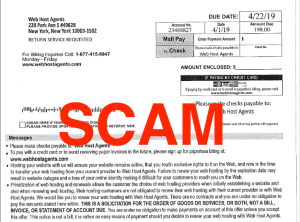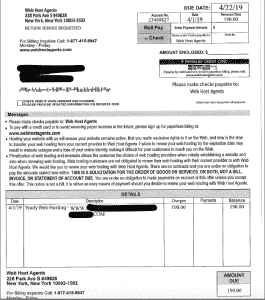A company called
I first reported this back in April 2019, and more than a year later they are still sending these fake invoices.
At first glance, it does look like an invoice for web hosting services. But, if you read the invoice carefully, you’ll see that it’s just a solicitation for web hosting services, and not an actual invoice. In opinion, Web Host Agents, though, is sending this to businesses, hoping that they will pay the invoice unknowingly. And most likely if it IS paid, then Web Host Agents would probably not ever end up hosting the website anyway, as significant steps need to be made by the business to transfer their website from their current web host to Web Host Agents. And, I suspect that if the bill is paid then the business will probably not be getting a call from Web Host Agents to help them move their website from their current web host to them. Unless, of course, there is an ‘upsell’ opportunity, whereas Web Host Agents thinks that they can further sell this business some additional services.
Here’s what technically tells us that this is a sales letter and not an actual invoice:
“Hosting your website with us will ensure your website remains active, that you retain exclusive rights to it on the Web, and now is the time to transfer your web hosting from your current provider to Web Host Agents. Failure to renew your web hosting by the expiration date may result in website outages and a lost of your online identity making it difficult for your customers to reach you on the Web.
Privatization of web hosting and renewals allows the customer the choice of web hosting providers when initially establishing a website and also when renewing web hosting. Web hosting customers are not obligated to renew their web hosting with their current provider or with Web Host Agents. We would like you to renew your web hosting with Web Host Agents. There are no contracts and you are under no obligation to pay the amounts stated here within. THIS IS A SOLICITATION FOR THE ORDER OF GOOD OR SERVICES, OR BOTH, NOT A BILL, INVOICE, OR STATEMENT OF ACCOUNT DUE. You are under no obligation to make payments on account of this offer unless you accept this offer. This notice is not a bill, it is rather an easy means of payment should you decide to renew your web hosting with Web Host Agents.”
What I call this is a “snail mail” phishing type of scam. It’s like an email that you may receive, and it’s meant to look like a bill or invoice–but they are sending this via postal mail instead. As with any scam or phishing attempt, one of the signs that helps you tell that it’s a scam is the lack of proper grammar. In this case, you can see, the grammar is poor, and it’s missing commas and there are misspellings. For example, the word “reatin” is used, and it’s supposed to be “retain”. As in you “reatin exclusive rights”. The sentences aren’t written well, either.
Web Hosting and Your Website
When you buy a domain name, you need website hosting for the actual files that contain your website content. The money you pay for domain name registration is different than what you pay for web hosting. Once a website is created, you need to pay a web host, like HostDime (see the ad for them on the right side of this page), a legitimate company that hosts your website. They charge a monthly fee for web hosting. You can also pay it on an annual basis, but I recommend paying monthly for web hosting. You’d pay a domain name registrar, like GoDaddy, Network Solutions, or NameCheap separately.
When you buy a domain name from a domain name registrar, you have to point your domain name using Name Servers at your registrar. You update them to point to the proper location of where your website is hosted. If your website is currently hosted, and it is if it’s up and running right now, not only would you have to pay a company like Web Host Agents, you’d have to make changes to your current domain name so that it points to the new location–and then transfer all of the files for your website to the new website hosting company. This isn’t an easy task–it’s pretty technical, and pretty complicated if you’re not familiar with the process. It can can have disastrous effects on your business if not done correctly. Your website can go down, your emails will stop working. Customers could stop calling.
I don’t recommend doing business with any company that tries to trick you into hosting your website with them. Or someone who wants you to move your website without you wanting to move. That’s what Web Host Agents is doing in this case. I would call this sleazy, and a shady way of getting new customers.
The address of Web Host Agents:
Web Host Agents
228 Park Ave S #49829
New York, NY 10003-1502
Phone Number: 1-877-415-9947
WebHostAgents.com
I recommend that you do NOT do business with a company called Web Host Agents, mainly because of the way they’re soliciting business. They’re trying to get unsuspecting businesses to pay for website hosting–which reminds me of the domain name registration and search engine submission scams that have been going on for years.
Check with the BBB
As with any business that you’re going to do business with that may have a significant affect on your business, I recommend that you thoroughly check out the company. You can search Google for the company name, or you can even check them out on the Better Business Bureau (BBB.org) website. In this case, there is a significant number of complaints about this particular company, especially from sending fake invoices.
What You Should Do
If you have received an invoice from Web Host Agents for “website hosting” services, as described above, then I’d ignore the “invoice” and do NOT pay it. It’s not an invoice that you need to pay to keep your current website up and running. In fact, you’re actually already paying for website hosting if you have a domain name and a website that’s currently up and running on the internet.
Determine how they got your information, such as your business name and address in the first place. Most likely they have pulled your contact information from the WHOIS database, which is the public record that shows who owns your domain name. Look up your domain name in the WHOIS records (you can search here: https://lookup.icann.org/) and see what information is available to the public. If there’s anything incorrect, then you need to correct it. Incorrect WHOIS information can lead to your domain name getting suspended. If you do not want the information there to be public, then you can pay your registrar (where you bought your domain name) to keep that information private.
If you have already paid this invoice by mistake, then hopefully you used your credit card. Contact your credit card company, tell them you were scammed, and have them reverse the charges. I have not been shown any cases where this company has received payment and actually provided the service that was paid for. So, in my personal opinion, this is something that you should not pay for.
Update January 2020
January 2020: we continue to see these invoices from Web Host Agents, and I continue to get people who think that somehow I might be connected to the company. I can tell you that I am not connected in any way. I have received these fake invoices as well, and started receiving them back in April 2019. So, you’re not alone. I recommend that you take the time to review your current domain name registration, as well as the web hosting you have set up for your website. I would NOT pay any invoice from Web Host Agents–just shred it. It’s a fake invoice.
Update July 2020
I continue to see these fake invoices, and business still continue to receive them. Again, if you receive one of these invoices you need to put it in the trash or shred it. Please do not pay their fake invoice. If you paid using a credit card, then you should dispute the charge immediately.

